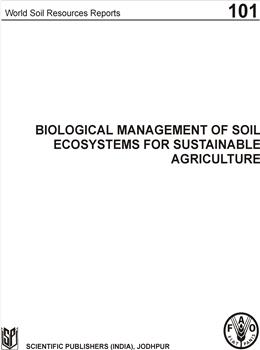
| Select | Format | USD( ) |
|---|---|---|
| Print Book | 49.00 39.20 20%Off | |
| Individual E Book | Buy Now | |
| Institutional E Book | Price available on request |
This publication contains the proceedings of the Brazilian Agricultural Research Corporation (EMBRAPA)/FAO International Technical Workshop on Biological Management of Soil Ecosystems for Sustainable Agriculture, which was held at EMBRAPA-Soybean headquarters in Londrina, Brazil, from 24 to 27 June 2002. The report includes a review of current understanding and knowledge of the biological management of soil ecosystems through a set of case studies from different production systems and socio-economic conditions, in the areas of indicators and assessment of soil health, adaptive management and innovative technologies. A general discussion and review of lessons learned leading to the main recommendations and further steps for the implementation of an International Soil Biodiversity Initiative are also presented. The financial support was provided through the agricultural biodiversity component of the FAO-Netherlands Partnership Programme.
Summary
Acknowledgements
List of Figures
List of Boxes
List of Plates
List of Tables
Acronyms
1. Objectives and Context of the Londrina workshop
Background
Soil biodiversity, agriculture, sustainable management and farmer context Workshop process and objectives
2. Review of knowledge and issues through case studies on soil Biodiversity, Ecosystem Management and Sustainable Agriculture
Indicators for assessment and monitoring of soil health
Case 1 – Bioindicators of soil health: their use by the sugar-cane industry in Australia
Case 2 – Participatory assessment of macrofaunal functional groups for rehabilitation and improved productivity of pastures, cropland and horticulture
Case 3 – Methods for assessment of soil health or quality focusing on a case in Bhutan Adaptive management for enhanced soil productivity and restoration
Case 4 – Adaptive management and technology innovation in Mindanao, Philippines
Case 5 – Biodynamic agriculture for reclamation and cotton production in Egypt
Case 6 – Biofertilizers – arbuscular mycorrhizal fungi and Rhizobium bacteria – for mixed agriculture in Cuba
Case 7 – No-till agriculture for smallholder cropping in Brazil
Case 8 – A case of the transition of a renowned coffee growing area
Case 9 – Selection of legumes that produce beneficial plant flavonoids for various functions
Case 10 – Integrated pest management and biomass management for managing Helicoverpa armigera (pod borer) and enhanced productivity in Asia
Case 11 – Plant parasitic nematodes associated with common bean: as integrated management approach in Kenya
Case 12 – Role of termites in the soil rehabilitation process in Burkina Faso
Case 13 – Use of vermicompost with a focus on tea plantations in India
Case 14 – Use of vermicompost to reduce soil A1 toxicity in Brazil
Case 15 – Conservation and sustainable use of soil biodiversity
Case 16 – Adaptive management for redeveloping traditional ecosystems Capacity building for integrated soil biological and ecosystem management
Case 17 – Capacity building tools and methods for improving knowledge
Case 18 – The Global Environment Fund (GEF) – TSBF BGBD Network project on the conservation and sustainable management of below-ground biodiversity
Case 19 – The organic resources database
Case 20 – Use of farmer field schools for soil productivity improvement (FFS-SPI)
Case 21 – The African Conservation Tillage network Research and innovation in soil biological understanding and application
Case 22 – Innovative methods for monitoring soil biological activity and pest-pathogen interactions
Case 23 – Soil biological activity and C sequestration with a focus on no-tillage systems in Brazil
Case 24 – CGIAR Challenge Programme on Biological Nitrogen Fixation (CP-BNF)
Case 25 – Soil and water conservation research in Burkina Faso
3. Workshop discussions and findings on Improving Understanding and Management of soil biodiversity and ecosystems for productive and sustainable agriculture
Soil biodiversity understanding, status and trends
Biological indicators of soil health
Development of an assessment and monitoring framework
Development of target values and thresholds
Development and adaptation of productive and sustainable agricultural management practices
Integrated ecosystem and adaptive management approaches for soil health
Sharing experiences and lessons learned and identification of gaps and priorities
Sustainable production systems
Organic matter management and the soil ecosystem
The cropping system and the soil ecosystem
4. Strategy and Actions for Implementing the Soil Biodiversity Initiative
Guiding principles and objectives
Strategic framework on soil biodiversity and agro-ecosystem management
Increasing recognition of the essential services of soil biodiversity across all production system and its relation to land management
Capacity building to promote the adoption of integrated approaches and coordinated activities for the sustainable use of soil biodiversity and the enhancement of agro-ecosystem functions
Parnership development and coorperation
Operational mechanisms
Framework for action as a basis for the further development of the Soil Biodiversity Initiative
Objective 1 – Sharing of knowledge and information and awareness raising
Objective 2 – Capacity building for the development and transfer of knowledge of soil biodiversity and ecosystem management into farmers practices
Objective 3 – Strengthening collaboration among actors and institutions and mainstreaming soil biodiversity and biological management into agricultural and land management and rehabilitation programmes
References
Annexes
1. Workshop Agenda
2. Workshop Participants and Contact Details
3. Working group composition and guiding questions
4. Matrix of Case Studies on soil Biodiversity and Ecosystem Management
5. Ongoing Activities and Potential Collaborative Actions
6. Indicative outline for case studies on agricultural biological diversity and checklist for their analysis
7. The Ecosystem Approach and Adaptive Management

SCIENTIFIC PUBLISHERS
"Granthlok"
5-A,New Pali Road,
Bhagat Ki Kothi (Nr. Police Station)
P. O. Box 91, Jodhpur - 342001 (Rajasthan), INDIA
Mob. :+91-9929272222 +91-9799991782
Tel. :+91-2912433323
Email. info@scientificpub.com
Web. www.scientificpubonline.com
DELHI BRANCH
"Granthlok"
4806/24, Ansari Road,
Bharat Ram Road,
Darya Ganj
New Delhi 110002
INDIA
Mob. : +91-95211 31111
Tel. +91-11-47590696
Email. scientificpubdelhi@gmail.com
Make sure you dont miss interesting happenings
by joining our newsletter program

© 2024 SCIENTIFIC PUBLISHERS | All rights reserved.